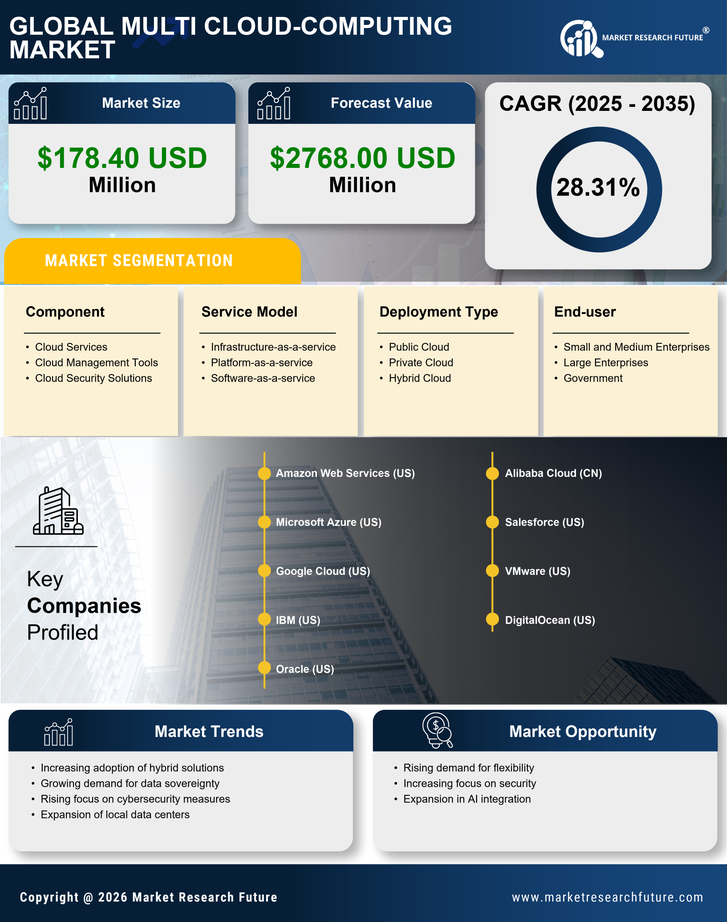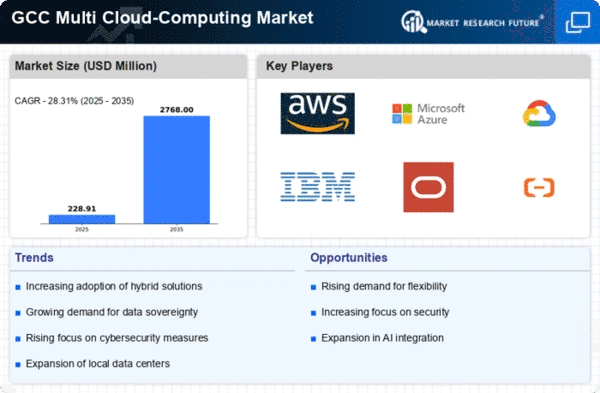Cost Optimization Strategies
Cost management remains a critical focus for organizations operating within the multi cloud-computing market. In the GCC, businesses are increasingly adopting multi cloud strategies to optimize their IT expenditures. By utilizing multiple cloud providers, companies can take advantage of competitive pricing and tailor their services to meet specific needs. Recent analyses suggest that organizations can achieve cost savings of up to 25% by strategically distributing workloads across various cloud platforms. This financial incentive is likely to propel the growth of the multi cloud-computing market, as companies seek to enhance their operational efficiency while minimizing costs. The trend indicates a shift towards more financially savvy cloud strategies, which could reshape the competitive landscape.
Growing Demand for Scalability
The Multi Cloud-Computing Market is experiencing a notable surge in demand for scalable solutions. Organizations in the GCC are increasingly seeking to enhance their operational efficiency by leveraging multiple cloud environments. This trend is driven by the need to accommodate fluctuating workloads and to ensure that resources can be adjusted dynamically. According to recent data, the scalability aspect of cloud services is projected to grow by approximately 30% in the next few years. Companies are recognizing that multi cloud strategies allow them to optimize costs while maintaining flexibility. As a result, the multi cloud-computing market is likely to see a significant increase in adoption rates, as businesses aim to align their IT infrastructure with their growth objectives.
Enhanced Disaster Recovery Solutions
In the context of the multi cloud-computing market, the emphasis on robust disaster recovery solutions is becoming increasingly pronounced. Organizations in the GCC are prioritizing the need for reliable backup and recovery options to safeguard their data. The multi cloud approach offers enhanced resilience, allowing businesses to distribute their data across various cloud platforms. This diversification mitigates risks associated with data loss and downtime. Recent statistics indicate that companies utilizing multi cloud strategies report a 40% improvement in their disaster recovery capabilities. As such, the demand for comprehensive disaster recovery solutions is expected to drive growth in the multi cloud-computing market, as organizations seek to ensure business continuity in the face of potential disruptions.
Integration of Advanced Technologies
The integration of advanced technologies is emerging as a pivotal driver in the multi cloud-computing market. Organizations in the GCC are increasingly leveraging artificial intelligence (AI), machine learning (ML), and the Internet of Things (IoT) within their multi cloud strategies. This integration allows for enhanced data analytics and improved decision-making processes. As businesses seek to harness the power of these technologies, the demand for multi cloud solutions is likely to rise. Recent projections indicate that the adoption of AI and ML in cloud environments could lead to a 35% increase in operational efficiency. Consequently, the multi cloud-computing market is poised for growth as organizations recognize the potential benefits of advanced technology integration.
Regulatory Compliance and Data Sovereignty
The multi cloud-computing market is significantly influenced by the increasing focus on regulatory compliance and data sovereignty in the GCC. Organizations are compelled to adhere to stringent regulations regarding data protection and privacy. Multi cloud solutions provide the flexibility to store data in specific jurisdictions, thereby ensuring compliance with local laws. This aspect is particularly relevant as governments in the region implement more rigorous data protection frameworks. As a result, businesses are likely to invest in multi cloud strategies that align with these regulatory requirements. The market is expected to grow as organizations prioritize compliance, with estimates suggesting a potential increase of 20% in adoption rates over the next few years.

















